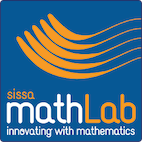The role of data science is constantly increasing in our society and the last decade has witnessed an enormous impact of new computational paradigms based on data-driven methodologies in practically all areas of modern applied mathematics. Substantial repercussions can be appreciated in engineering, biology and economics, to name a few fundamental fields, where, e.g., the use of machine learning to control turbulence and nonlinear dynamics or the analysis of complex multi-scale systems to model climate change or epidemic spread represent problems whose solution is now accessible whether not already attainable.
The different challenges posed by the growing complexity of realistic problems and relevant models are continuously feeding the need for innovative computational perspectives. In this respect, the unprecedented availability of huge quantities of data together with the possibility of exploiting vast computational resources has pushed scientific computing towards new frontiers, where, for instance, the traditional modelling approach based on first-principles is either strongly enhanced by data-driven inspired model order reduction schemes or even completely replaced by emerging fully data-driven model discovery techniques.
The School is organized precisely in view of discussing recent contributions to these emerging challenges following an initial overview of basic, yet cornerstone approaches characterizing data-driven methodologies, like, e.g., modern decomposition schemes stemming from SVD (dynamic mode decomposition, proper orthogonal decomposition and related) as well as other far-reaching techniques in the area of model order reduction, ranging from reduced-basis methods to empirical interpolation. It will also consider how machine learning and AI algorithms can be leveraged and integrated into reduced order modeling for improving the models generated from data.
The lectures will be complemented by hands-on exercise/laboratory sessions in which the participants will gain experience implementing the numerical methods. The main prerequisites are a basic knowledge of linear algebra and numerical analysis and some familiarity with a programming language, such as Python or Matlab. The necessary background material will be provided during the lectures or by means of printed material distributed in advance of the course.
References
[1] Brunton, S.L. and Kutz, N. J.: “Data-Driven Science and Engineering - Machine Learning, Dynamical Systems, and Control”, Cambridge University Press, 2019.[2] Benner, P. et al (eds): “Model Order Reduction”, Vol. 1-3, De Gruyter.
[3] Urban, K.: “The Reduced Basis Method in Space and Time: Challenges, Limits and Perspectives”, Springer CIME lecture notes, to appear.





